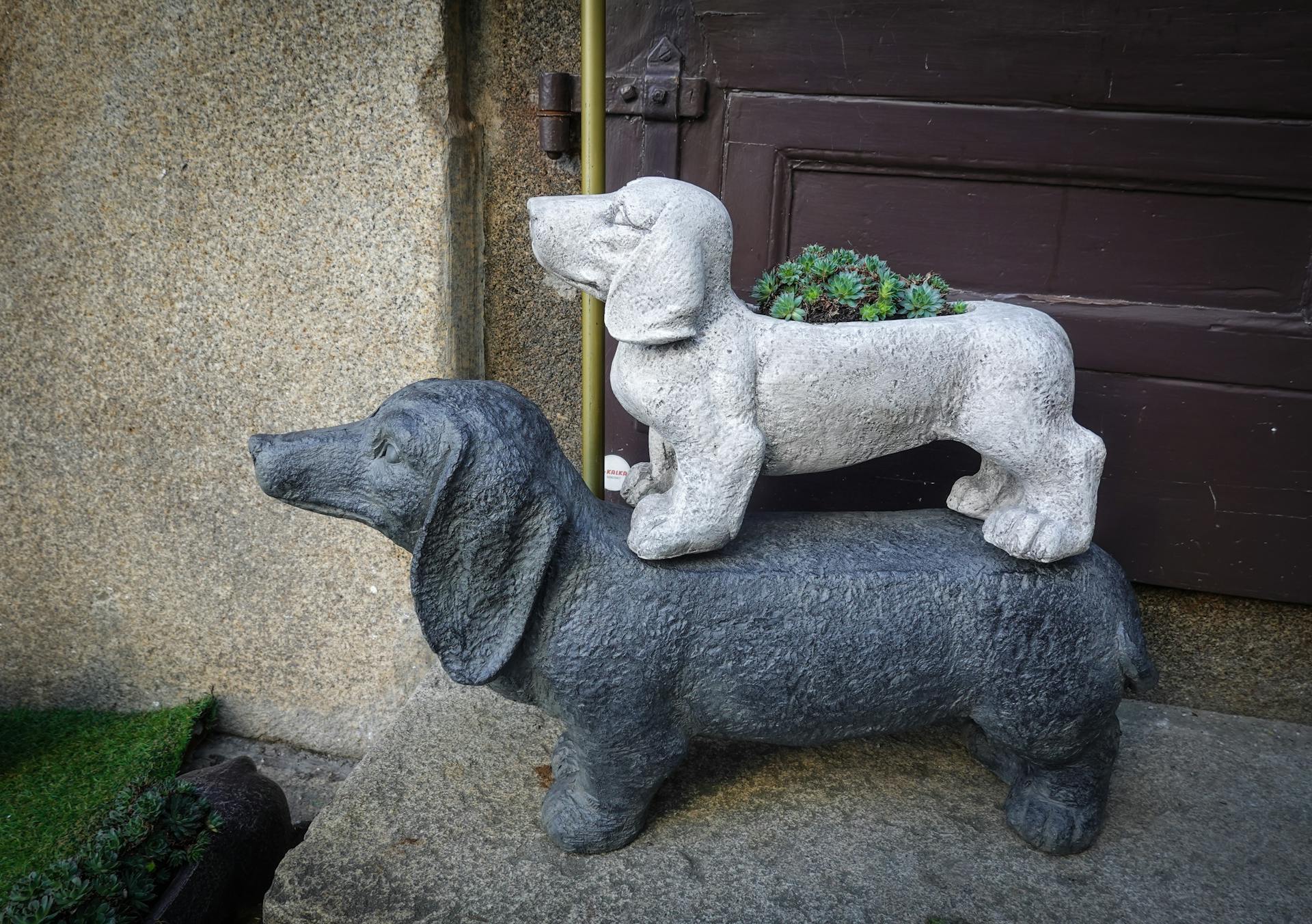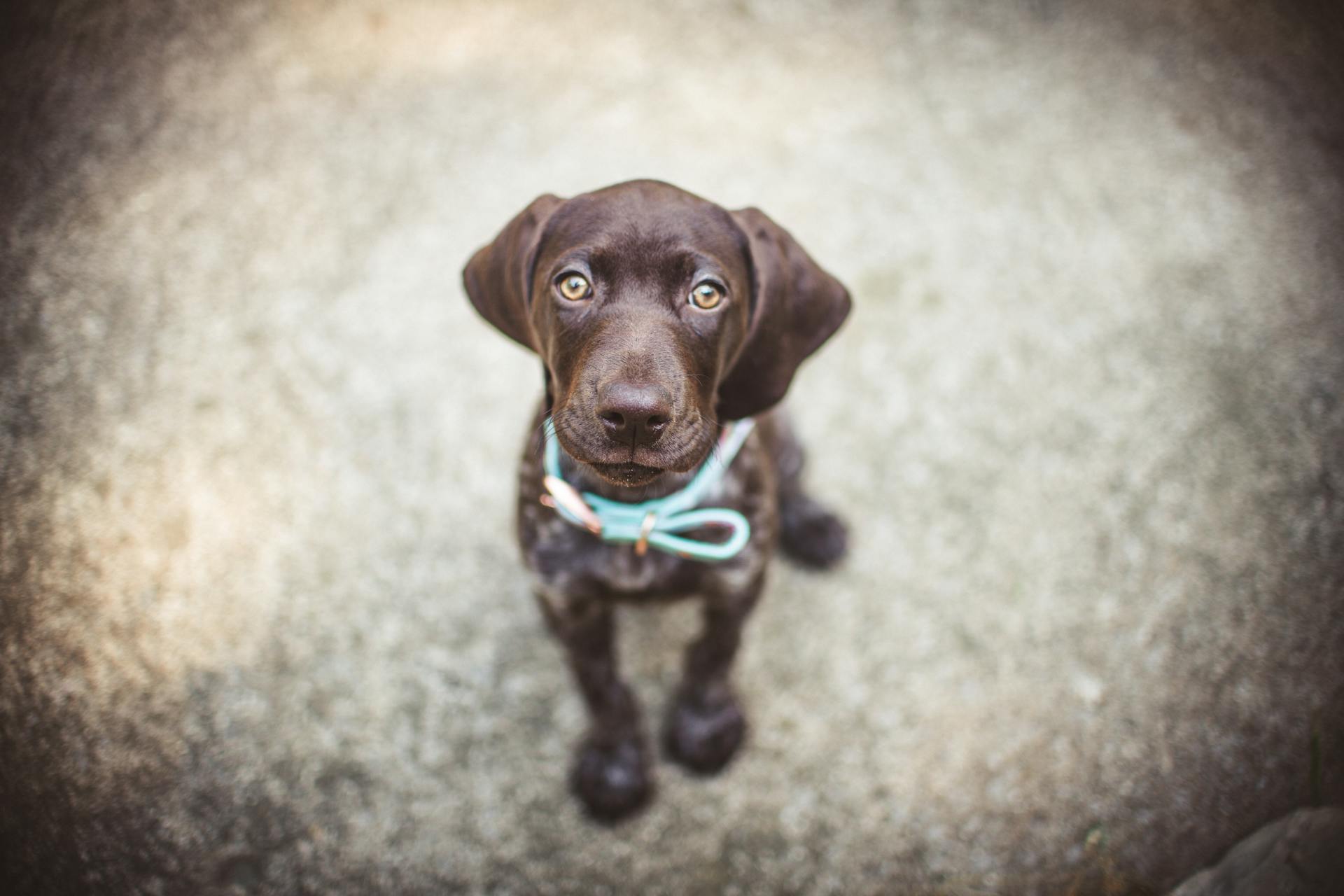
The Mini Dachshund Doodle is a relatively new breed that's quickly gaining popularity. They're a cross between a Miniature Dachshund and a Poodle, typically a Toy or Miniature Poodle.
These adorable dogs are known for their playful and affectionate nature. They inherit the intelligence and loyalty of both parent breeds, making them wonderful family pets.
Mini Dachshund Doodles are often described as " Velcro dogs" because of their tendency to stick close to their owners. This is due to their strong attachment to their pack, which they inherited from their Dachshund side.
Their energy level is moderate, requiring daily walks and playtime to keep them happy and healthy.
Broaden your view: Corgi Miniature Poodle Mix
Parent Breeds
The parent breeds of the Mini Dachshund Doodle are a fascinating mix. The Dachshund is a small hunting dog from Germany, originally bred to hunt badgers and other burrowing animals.
The Dachshund's distinctive elongated body and short legs make them a unique breed. They come in two sizes, Standard and Miniature, with Standard-sized Doxies reaching 16 to 32 pounds and Minis reaching about 11 pounds at full size.
Dachshunds are known for being stubborn, so they need owners who can stand up to them. Their coats can be either smooth or wire coated, making them a versatile breed.
The Poodle, the other parent breed, is a low-shedding dog that's perfect for families with allergies. They're intelligent, easy to train, and get along well with other pets, making them a great addition to any family.
Temperament and Intelligence
The mini Dachshund Doodle is a friendly and affectionate breed, making them excellent companions for families and singles alike. They're intelligent and eager to please, which means they can be relatively easy to train.
These dogs are known for their playful nature and are often described as having big personalities. They love being in the spotlight and receiving affection from their owners.
One thing to keep in mind is that Doxiepoos can be a bit stubborn at times, so early obedience training is essential. They're quick learners, but they need consistency and patience from their owners.
Doxiepoos are generally good with children and other pets, but early socialization is crucial to ensure they get along well with others. They're also content to go sniffing around in the yard after a rogue scent.
These dogs are highly intelligent and need plenty of mental stimulation to prevent boredom and behavioral problems. Without it, they can become restless and even aggressive.
They're loving and affectionate dogs that love playing, running, and dozing with their owners. They're also a high-energy breed that doesn't like to be left alone, so they need regular exercise and attention from their owners.
In general, Doxiepoos are adaptable dogs that can thrive in a variety of living situations, including families with children and elderly or mobility-impaired people.
Size and Appearance
They're small in stature, but with huge personalities. They can weigh anywhere from 10 to 30 pounds.
Their size can vary significantly depending on the size of the Poodle parent. Some can stand as short as 5 inches tall, while others can reach 15 inches tall.
They can have a variety of coat colors and textures, including curly, wavy, and short coats. Their coats can be light or dark, with brown and hazel tones in their eyes, and black or brown noses.
Worth a look: What Size Crate for Mini Dachshund
Poodle
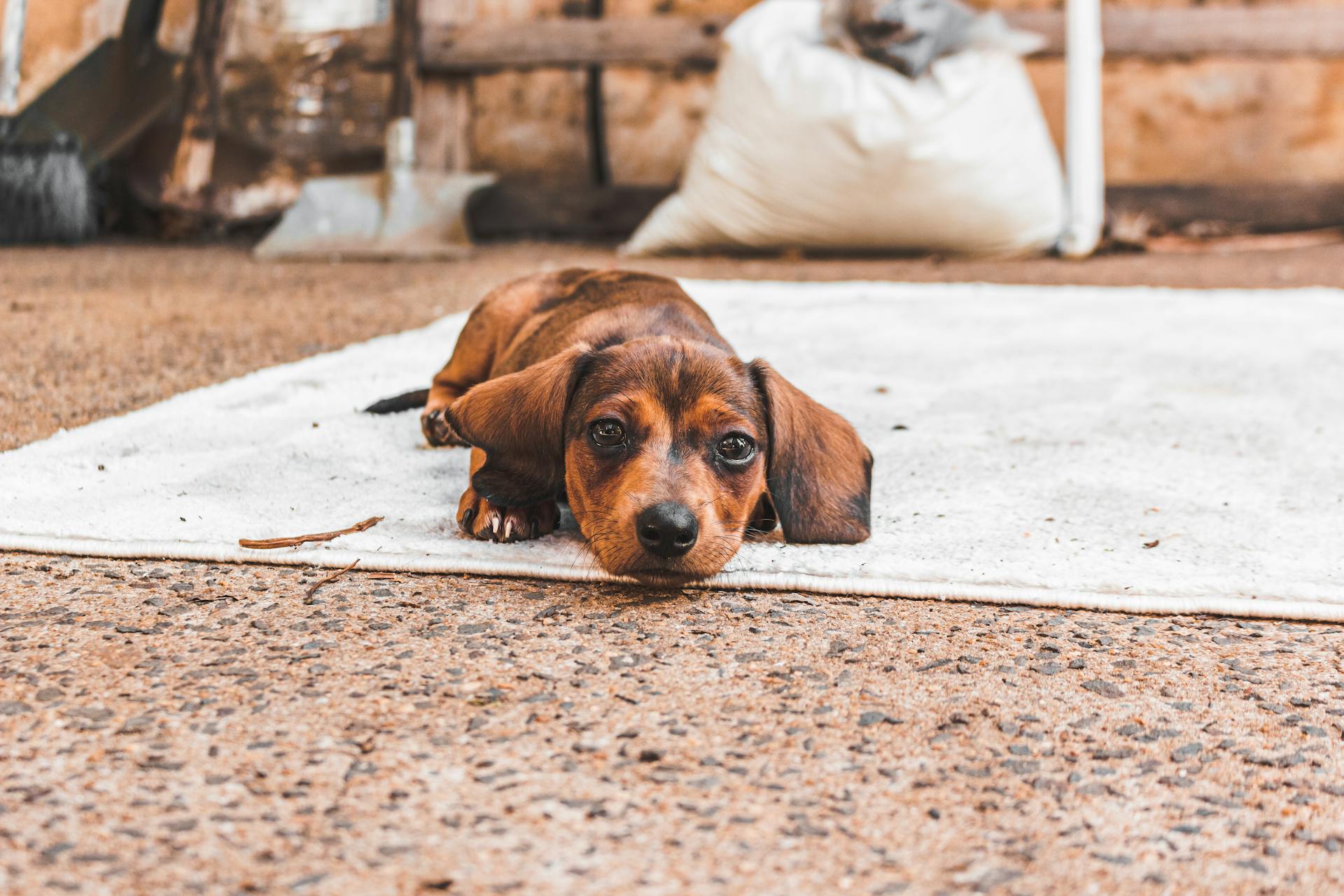
Poodles are the second smartest dogs in general, making them highly trainable with the right approach.
They simply explode with happiness whenever you pay attention to them, which can be a great motivator for training.
Varies Greatly in Size and Appearance
Doxiepoos can weigh as little as 10 pounds or as much as 30 pounds, depending on the size of the Poodle parent.
Their height can vary significantly, ranging from 5 to 15 inches tall, paw to shoulder.
Some Doxiepoos can inherit more Dachshund traits and have shorter legs, while others will have longer Poodle legs.
Their coat can be a mix of both parents, or completely different from either, making each Doxiepoo unique.
Doxiepoos can have light or dark-colored eyes, including brown and hazel tones, and their noses can be black or brown.
They can have a wide range of coat colors, including red, tan, cream, white, black, beige, liver, brown, chocolate, merle, pied, parti, phantom, and combinations thereof.
Their coat can be short, curly, medium, long, wavy, or smooth, depending on which parent they inherit traits from.
No two Doxiepoos will look the same, due to the complexity of canine genetics.
For your interest: Mini Bernedoodle Brown
Coat and Grooming
The coat and grooming of a mini Dachshund Doodle are truly unique features that set them apart from other breeds.
Their coat can range from short and wavy to long and curly, making it hard to predict what type they'll have, even based on their parents. Colors can include black, brown, liver, chocolate, gray, red, white, and cream, with possible markings and patterns like dapple, brindle, and sable.
Regular grooming is necessary to keep their coat healthy and tangle-free, especially if they inherit the Poodle's curly coat. Brushing should be done at least once or twice a week, depending on the length and texture of their coat.
To prevent matting and tangling, Doxiepoos with curly coats may require daily brushing, while those with wavier coats can get by with missing a day of brushing. Regular ear checks are also essential, as their floppy ears are prone to infection.
Here's a quick rundown of their grooming needs:
- Brushing: at least once or twice a week, depending on coat length and texture
- Daily brushing for curly coats
- Regular ear checks to prevent infection
- Occasional nail clipping and tooth brushing
Coat Colors
The Doxiepoo's coat colors are as varied as they are beautiful, ranging from black to brown, liver, chocolate, gray, red, white, and cream. They can also display coats of more than one color with different markings and subtle patterns.
You can expect to see dapple, brindle, and sable patterns in some Doxiepoos. These patterns add to the breed's unique charm and make each dog truly one-of-a-kind.
Some Doxiepoos may inherit the Poodle's lower shedding, hypoallergenic coat, but this is not guaranteed. The Dachshund's genetic influence can affect the coat's shedding tendency.
If you're looking for a Doxiepoo with a Poodle-like coat, it's possible they won't shed too much. However, if they inherit more Dachshund genes, you should expect some shedding.
Grooming
Grooming is an essential part of owning a Doxiepoo. Regular grooming helps to remove loose hair, dirt, and debris, and prevents matting.
Doxiepoos have low-shedding coats, making them ideal for people with allergies. However, they still require regular brushing, at least once or twice a week, depending on the length and texture of their coat.
Suggestion: Doodles Dog Grooming
Brushing helps to prevent matting and tangling, especially for Doxiepoos with curly coats. Professional grooming every few months is also recommended to keep their coat trimmed and well-maintained.
Doxiepoos also require regular ear cleaning to prevent infections, as their floppy ears can trap moisture and debris. Use a gentle ear cleanser or wipes once a week to keep their ears clean.
In addition to brushing and ear cleaning, Doxiepoos need regular nail trimming, teeth brushing, and dental care to prevent periodontal disease. Establishing a consistent grooming routine can help to prevent potential health issues and keep your Doxiepoo looking and feeling its best.
Here's a quick guide to help you keep your Doxiepoo's coat clean and healthy:
- Brush at least once or twice a week
- Bathe every 4-6 weeks
- Trim nails regularly (every 1-2 weeks)
- Clean ears weekly
- Brush teeth at least twice a week
Remember, grooming is not just about physical appearance; it's also essential for your Doxiepoo's health and well-being. By following these simple tips, you can help keep your Doxiepoo happy and healthy.
Health and Nutrition
Mini Dachshund Doodles are generally a healthy breed, but like any mixed breed, they can be prone to certain health issues. They can live quite a long time, 10 to 15 years or more.
To ensure your Mini Dachshund Doodle stays healthy, it's essential to feed them high-quality food. You should stick to real animal proteins and natural ingredients, and a mix of dry kibble and wet food is best.
Some owners choose to feed their pups fresh meals, but make sure to pick food with a reliable, natural meat protein source to provide energy. They should not be freely fed, as this will quickly lead to obesity.
Here are some recommended foods for your Mini Dachshund Doodle:
- Wellness Core Natural Grain-Free Dry Dog Food
- Earthborn Holistic Natural Dog Food
- NUTRO ULTRA Adult Dry Dog Food
Remember to consult your veterinarian before making any changes to their diet, as they can help you determine what types of food will benefit your Mini Dachshund Doodle and provide appropriate serving sizes.
Health and Conditions
Doxie Poos are generally a healthy breed, but like all dogs, they can be prone to certain health issues as they age.
Most Doxie Poos can live a healthy life for 12-15 years, depending on their size. Smaller dogs tend to live longer.

They can inherit health issues from their parent breeds, such as hip dysplasia, patella luxation, and thyroid issues.
Back issues and skin problems are also common in Doxie mixes, especially if they resemble their German parent.
Some Doxie Poos may develop intervertebral disc disease, a condition that can cause pain and weakness in the back.
This condition can be mild and treated with anti-inflammatory medication, but severe cases may require surgery.
Other health issues to watch out for include bloat, ear infections, and skin infections.
To keep your Doxie Poo healthy, it's essential to provide a good diet, regular exercise, and proper veterinary care.
Here are some common health issues to be aware of:
- Intervertebral disc disease
- Bloat
- Ear infections
- Skin infections
- Cancer
- Hip dysplasia
- Patella luxation
- Progressive retinal atrophy
Dietary Requirements Guide
Doxiepoos are generally healthy dogs, but they can be prone to certain health issues as they age. They can develop hip and joint issues and eye problems, so it's essential to consider adding bone and joint supplements and vision health supplements to their diet.
Stick to high-quality dog food that's formulated for medium and small breeds, and choose a mix of dry kibble and wet food for optimal nutrition. A reliable, natural meat protein source is key to providing energy for your Doxiepoo.
Doxiepoos have sensitive digestion, so it's best to avoid foods that contain dairy, grains like wheat or corn, fillers, and artificial ingredients. A diet rich in protein with meats like chicken, turkey, fish, and lamb is a good starting point.
To avoid overfeeding, don't free-feed your Doxiepoo, and provide small portions with a few treats. The ideal daily food intake for a Doxiepoo is between one to two cups of food, depending on their size.
Here are some high-quality dog food options to consider:
- Wellness Core Natural Grain-Free Dry Dog Food
- Earthborn Holistic Natural Dog Food
- NUTRO ULTRA Adult Dry Dog Food
Remember to consult your veterinarian before making any changes to your Doxiepoo's diet, as they can help determine the best food and serving sizes for your dog.
Three Little-Known Facts About Poop
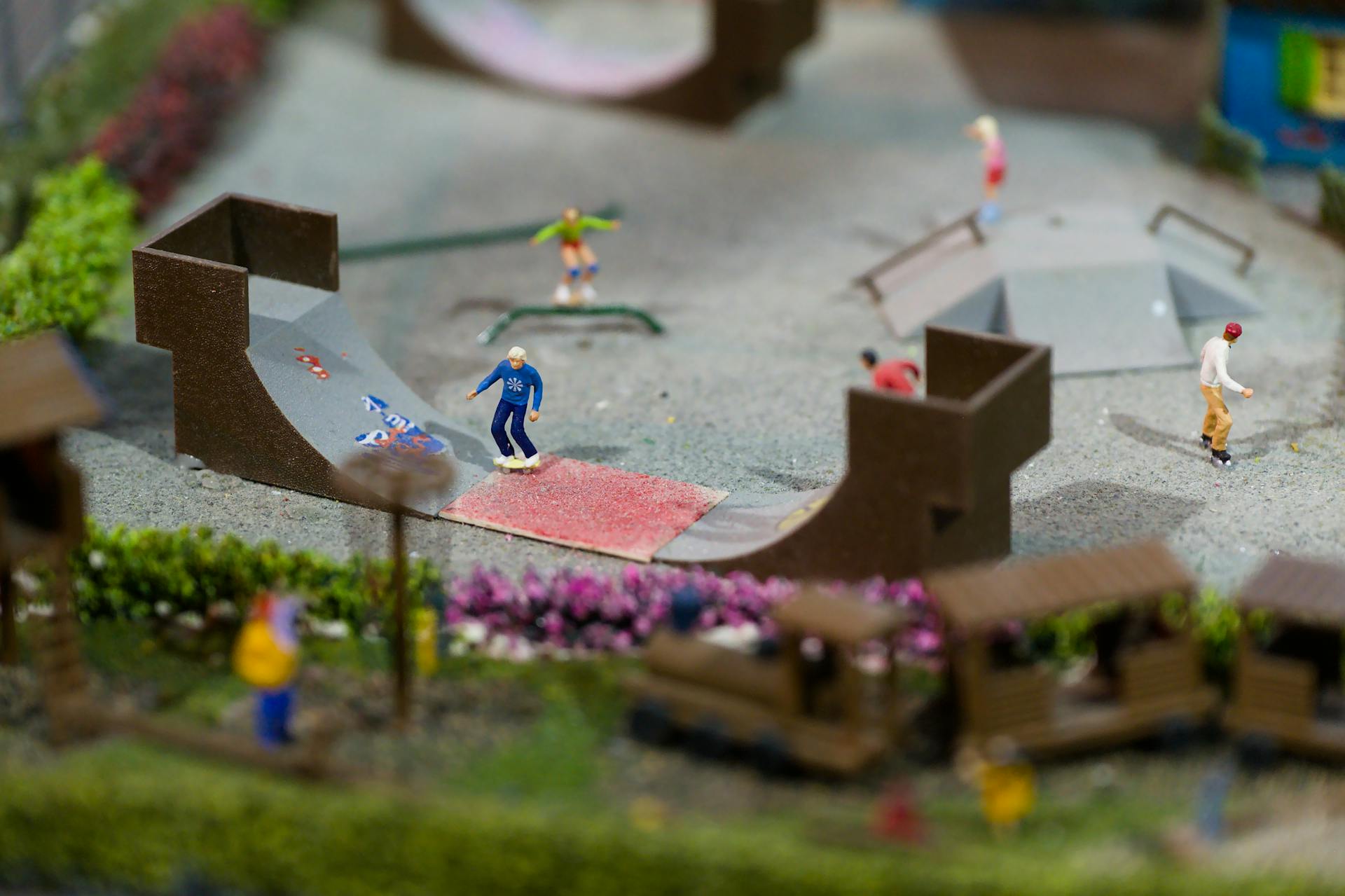
Here's the deal with poop - it's not just a waste product, but also a window into our overall health. The color, consistency, and frequency of our poop can give us valuable clues about what's going on inside our bodies.
A healthy poop is typically brown, due to the presence of bilirubin, a pigment produced during the breakdown of red blood cells.
Cost and Breeding
The cost of a Mini Dachshund Doodle can vary greatly, ranging between $250 to $2,000, depending on the bloodline and pedigree of their parents.
Reputable breeders invest time and money on health testing the parent dogs, which is a must due to the Dachshund breed's tendency to suffer from health issues and genetic problems.
You can expect to pay a few hundred dollars in supplies and initial setup, including crates, food, toys, blankets, puppy pads, and more.
Broaden your view: Mini Dachshund Health Issues
The Cost of a Puppy
The cost of a puppy can be a significant investment. Dachshund Poodle mixed pups can range from $250 to $2,000, depending on the bloodline and pedigree of their parents.
Reputable breeders take time and money to health test their parent dogs, which can drive up costs. Some breeders charge almost $2,500 for these pups.
You'll also need to budget for initial setup and supplies, including crates, food, toys, blankets, and puppy pads. This can add up to a few hundred dollars.
Good breeders prioritize the health of their dogs and only use healthy dogs in their breeding programs. This is especially important for breeds like Dachshunds, which are prone to several health issues.
A different take: Mini Bernedoodle Breeders
What is Poo?
A Doxiepoo, also known as a Doxiedoodle or simply Doodle, is a hybrid dog obtained by crossing a Dachshund with a Toy or Miniature Poodle.
The Doxiepoo's appearance is not predictable, like all hybrid dogs.
The Doxiepoo's origins are not clearly known due to a lack of documentation, but some people believe it might have first been created around the 1990s.
The craze for designer dogs began a few decades ago when the first Doodle mix was created, which was a hybrid dog having one Poodle parent.
Doxiepoos are cute, cuddly, and compact dogs, having Poodle genes that make them fairly easy to train.
The Dachshund breed is known for its stubborn streak, which can make training challenging, but the Poodle genes in Doxiepoos can help overcome this.
The Doxiepoo is not registered with the Australian Kennel Club, but the American Canine Hybrid Club keeps track of the parentage and heritage of such hybrid dog breeds in the USA.
Pet Compatibility
Doxiepoos make wonderful family pets, but they do have some specific needs when it comes to pet compatibility. They may be very needy and require a lot of attention, so be prepared to devote time and energy to your new furry friend.
Doxiepoos generally get along great with other dogs and pets, provided they are socialized at a young age. Socializing them early on helps immensely with them adjusting to life with other pets in the home.
However, it's essential to remember that Doxiepoos have a strong prey drive and may view small mammals, birds, and reptiles as potential prey. This means it's not recommended for Doxiepoos to live with other kinds of pets in the home, particularly small mammals, birds, and reptiles.
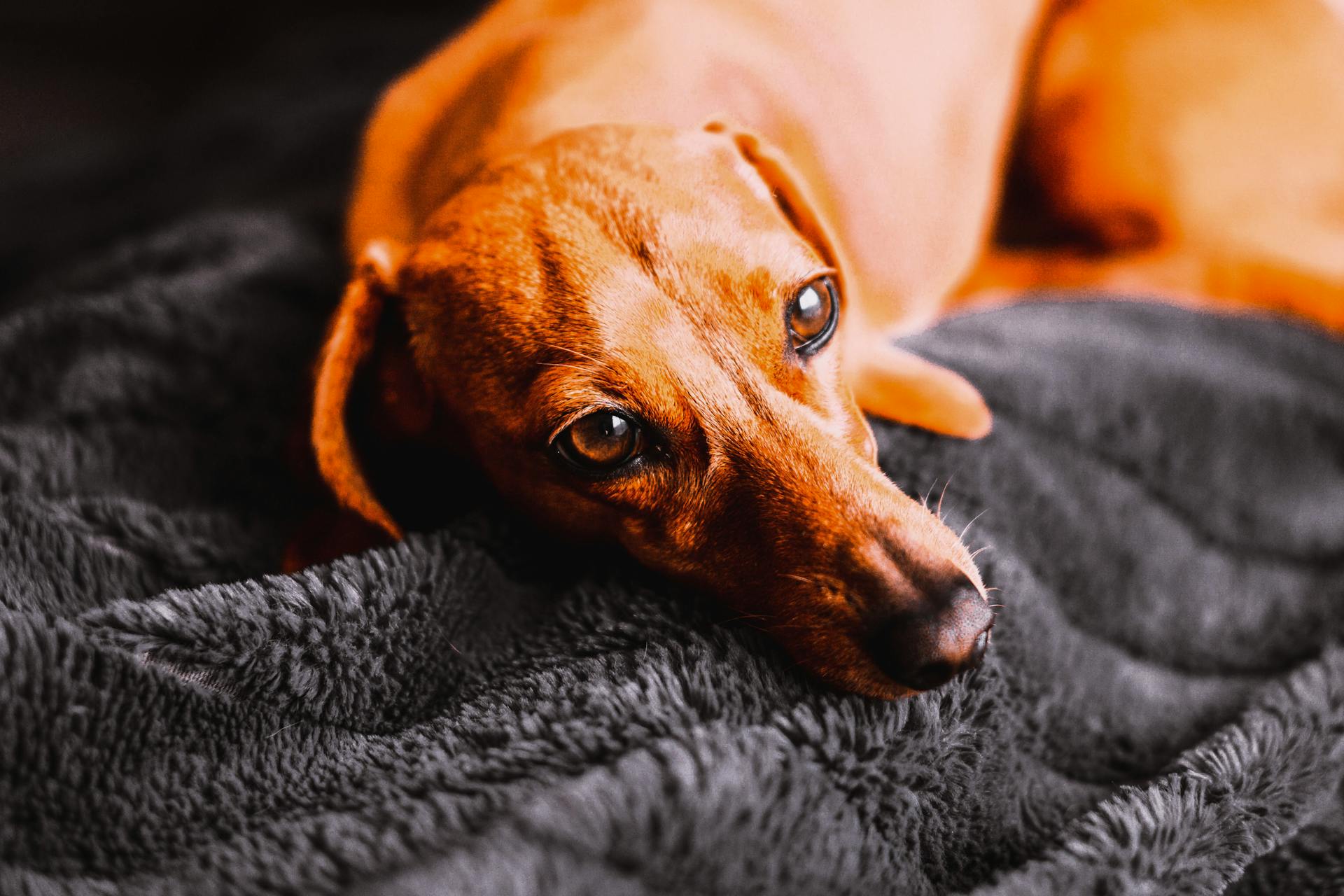
Doxiepoos love being around people and make great family pets, but they can be a bit shy and wary of strangers. They will warm up to new people in no time, but it's essential to introduce them slowly and under controlled circumstances.
To ensure a harmonious household, it's crucial to teach children how to interact with Doxiepoos safely and respectfully. Children must learn to play with Doxiepoos gently and not to overstep their boundaries.
Here are some essential tips for introducing a new Doxiepoo to your household:
- Start with a slow introduction to new pets and people
- Supervise interactions between children and Doxiepoos at all times
- Teach children how to handle Doxiepoos gently and respectfully
- Provide plenty of exercise, mental stimulation, and attention to your Doxiepoo to prevent boredom and restlessness
By following these tips and being mindful of your Doxiepoo's needs, you can create a happy and harmonious household for both your family and your new furry friend.
Allergies and Health Issues
Doxiepoos can be prone to back issues and skin problems, characteristic of the breed. Some Dachshund mixes may suffer from seizures.
While Doxiepoos are generally a healthy breed, they can inherit common issues from their purebred parent breeds. Intervertebral disc disease is a major problem seen in Dachshunds and some Doxiepoos inherit it.
Doxiepoos are also prone to hip/elbow dysplasia, seizures, neurological issues, and cardiac problems. Healthy Doxiepoos are known to live for 12-15 years depending on their size.
Some other conditions include eye issues like cataracts and progressive retinal atrophy, but these are usually diseases of old age.
Not All Are Allergy-Friendly
Not all Doxie Poos are allergy-friendly, as they can inherit the moderate shedding trait from their Dachshund parent.
Dachshunds are known to be moderate shedders, and if your Doxie Poo has a wavy coat, they might also shed moderately.
In most cases, Doxie Poos are minimal shedders, but those with wavy hair tend to shed more than those with curly hair.
If you're considering a Doxie Poo as a hypoallergenic breed, be aware that their shedding habits can vary.
Dog Allergies: Causes, Symptoms, Treatment
Dog allergies can be a common struggle for many dogs, including poodle mix breeds.
Poodle mix breeds are no exception to dog allergies, which can be caused by various factors including genetics, environmental allergens, and skin conditions.
Dogs with allergies may exhibit symptoms such as itching, scratching, and skin irritation.
Symptoms can range from mild to severe and may also include digestive issues and ear infections.
Treatment for dog allergies typically involves identifying and avoiding triggers, using medication, and making lifestyle changes.
Common triggers include pollen, dust mites, and certain foods, which can cause allergic reactions in some dogs.
Preventing dog allergies requires careful consideration before bringing a new dog home, including researching breed-specific health issues.
On a similar theme: Corgis Mixed with Other Breeds
Dog Itchy Rash on Belly
A dog itchy rash on the belly area can be a real nuisance for our furry friends. It could be caused by food or environmental allergies, parasites, or other underlying health issues.
Some common signs of an itchy belly rash in dogs include excessive scratching, chewing, or licking of the affected area.
Parasites like fleas, ticks, and mites can cause intense itching and discomfort for dogs. They can also lead to skin infections and other secondary health problems.
If you suspect your dog has an itchy rash on the belly, it's essential to consult with a veterinarian to determine the underlying cause and develop a treatment plan.
Frequently Asked Questions
Do Dachshund Poodle mix shed?
Doxie Poos are generally minimal shedders, but shedding can vary depending on their hair type. Those with wavy hair tend to shed more than those with curly hair
What is a doodle mini?
A Mini Goldendoodle, also known as a Doodle Mini, is a cross between a Golden Retriever and a Miniature or Toy Poodle, resulting in a small and adorable offspring. This hybrid breed combines the friendly nature of Golden Retrievers with the intelligence and low-shedding coat of Poodles.
Sources
Featured Images: pexels.com

